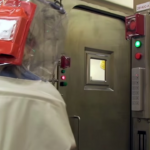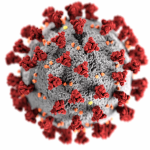Does the shutdown increase America’s vulnerability to bio-terrorism?
By Laura H. Kahn | October 11, 2013
Among the more dangerous consequences of the government shutdown that began on October 1 is that it severely compromises health authorities’ ability to respond to and prevent infectious diseases. With the response to common outbreaks impaired, any reaction to a bioterrorist attack could be even more jeopardized.
Public health should be considered a national security issue. Civil society quickly deteriorates when people are dying en masse from a deadly infectious disease. A nation’s best protection against bioterrorism is its public health infrastructure, and if nobody is at the helm, then citizens are sitting ducks.
Consider what’s going on at the Centers for Disease Control and Prevention (CDC), the US government’s primary public health agency.
With the flu season approaching, the agency has had to furlough more than three-quarters of its 13,000 employees. This means that the CDC is unable to support the nation’s seasonal flu program or help state and local governments conduct infectious disease surveillance. The processing of laboratory specimens is being cut back, meaning that diagnosing potential outbreak victims could be severely delayed, possibly allowing a deadly contagion to spread unchecked. Fortunately it is still early in the flu season and there’s no shortage of vaccine—although FluView, the CDC’s weekly summary of influenza surveillance data, has been suspended. And, while seasonal influenza might not be a concern at the moment, other scourges emerge all the time.
Food-borne illnesses, for instance, are always a threat. Meat and poultry production facilities remain relatively safe because legally, inspectors and public health veterinarians from the US Department of Agriculture’s Food Safety and Inspection Service must be present in every processing plant. Since their presence is mandatory, they cannot be furloughed. However, they inspect only 20 percent of the nation’s food supply.
The Food and Drug Administration (FDA) inspects the other 80 percent, and roughly 45 percent of its employees, mostly food inspectors, have been furloughed. This means that 91 percent of the seafood that the United States imports is not being inspected. The United States imports 50 percent of its fruit and 20 percent of its vegetables. These are not being inspected either. (However, even during business as usual, the FDA inspects less than 2 percent of most imported food.)
The FDA will not be doing routine inspections of domestically-produced fruits, vegetables, or seafood either. In partnership with states, the agency normally inspects about 80 facilities per day. As it is, the FDA is severely underfunded. In March 2013, when the government’s $85 billion in automatic budget cuts went into effect, FDA spending was cut by $209 million. In 2013, there were 2,100 fewer inspections than in 2012.
In addition to conducting food safety inspections, the FDA works with the CDC to investigate food-borne outbreaks. The FDA conducts trace-backs of foods believed to have caused widespread illness, issues food recalls, and responds to food emergencies. Several on-going outbreak investigations have been suspended. Right now, an on-going outbreak of Salmonella Heidelberg, a bacteria that causes diarrhea, fever, and abdominal cramping,has sickened 278 people in at least 17 states, mostly (77 percent) in California. Forty-two percent have required hospitalization. The government shutdown is very likely hurting the CDC’s and FDA’s abilities to investigate and respond.
Most Americans assume that they won’t get sick from the food they eat, and won’t die from an outbreak of a deadly infectious disease. Most of the time, with a functioning government, their presumptions are justified. But with a government shutdown interrupting the silent, unnoticed forces that work hard to keep people healthy, nothing should be taken for granted.
Public health and food safety are critical governmental functions that protect the public against infectious disease outbreaks—from those due to natural disasters or human errors, to those caused by individuals or organizations wishing to do harm. It is foolish, and foolhardy, to furlough the professionals who diligently conduct surveillance of, respond to, and prevent epidemics.
Together, we make the world safer.
The Bulletin elevates expert voices above the noise. But as an independent nonprofit organization, our operations depend on the support of readers like you. Help us continue to deliver quality journalism that holds leaders accountable. Your support of our work at any level is important. In return, we promise our coverage will be understandable, influential, vigilant, solution-oriented, and fair-minded. Together we can make a difference.
Topics: Biosecurity, Columnists














